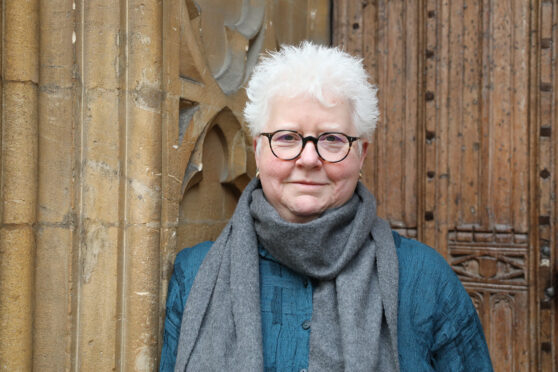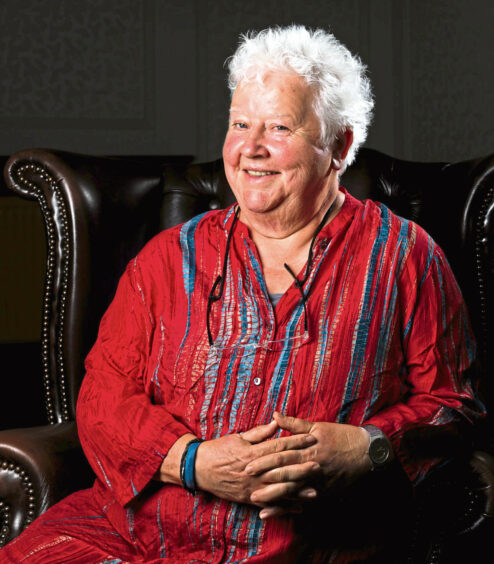
Authors and literary experts, including best-selling author Val McDermid, have criticised Creative Scotland for failing to fund Glasgow’s iconic Wee Write festival for children.
Designed to encourage children to read and improve literacy skills at a time when reading abilities are at an all-time low, the festival has helped thousands to immerse themselves in books and learning.
But, despite coming under investigation by the Scottish Government over its decision to spend £110,000 on explicit hardcore porn film REIN, Creative Scotland continues to cause furore by pulling the plug on the £77,500 funding for two of the country’s biggest book festivals – Glasgow’s Aye Write for adults and Wee Write for children.
Yesterday Douglas Stuart, who won the Booker Prize for his novel Shuggie Bain, posted a series of tweets criticising the funding refusal.
He said: “Aye Write is not just about one city or one festival, it’s about a nation’s pride in her art. It’s about working class access to literature – and let’s not be coy here: working class people are crucial to Scottish literature. Get a haud of yersels. And let Glasgow be great.”
Aye Write is not just about one city or one festival, it’s about a nation’s pride in her art. It’s about working class access to literature – and let’s not be coy here: working class people are crucial to Scottish literature.
Get a haud of yersels. And let Glasgow be great.
— Douglas Stuart (@Doug_D_Stuart) March 30, 2024
Scottish novelist Andrew O’Hagan, a three-times Booker Prize nominee, described the cancellation as “amazingly depressing”, adding, “its savage and it shouldn’t be happening.”
The decision was also slammed by Dr Sarah McGeown, director of Edinburgh University’s Literacy Lab – which focuses on improving children’s reading.
She said: “There is a deeply worrying decline in the number of people reading books and festivals are one of the few places that encouraged children and families to get together and read, so the decision to withdraw funding truly is devastating. Improving literacy and closing the attainment gap are two government priorities, and reading is aligned with both, which is why these festivals played such an important role.”
Creative Scotland facing questions
Creative Scotland’s £185,000-a- year CEO Iain Munro has already been told to expect tough questions over the REIN debacle, but the organisation remains bullish despite protestations by former First Minister Nicola Sturgeon for them to think again, laying the blame squarely at the government’s door for cutting around £6.5 million funding.
The organisation said: “We are currently only able to support around 30% of applications to our Open Fund due to limitations on the money available to us and difficult decisions need to be made on a daily basis.”
Children’s author Angela Proctor, whose Thumble Tumble books are about a teenage witch who lives on Arran surrounded by magical creatures, said: “Very hard questions must be asked about these decisions and priorities, particularly why a festival that encourages children to read gets nothing while other projects get funded. I’ve taken part in Wee Write several times and the positive effect it has on children is very clear to see in their level of enthusiasm and engagement.”
Proctor, who has visited more than 300 schools, said: “Encouraging a child to read is one of the most precious gifts you can give, so the decision not to fund Wee Write is incomprehensible at a time when the Scottish Government is supposedly making reading and closing the attainment gap a priority.”
Multi-award-winning children’s author Ross MacKenzie, whose book The Nowhere Emporium won both the Blue Peter Book Award and Scottish Children’s Book Award, said: “Wee Write is one of the most important and well-loved children’s festivals in Scotland. I’ve been lucky enough to see firsthand that these events have the power to inspire children and, hopefully, spark a lifelong love of reading.
“The cancellation of the festival means kids will miss out on memorable and important experiences.”
Marc Lambert of the Scottish Books Trust, the charity that helps deliver reading programmes and supports authors across Scotland, said: “Leaving Glasgow, a profoundly literary city, without a book festival is clearly not ideal, and will leave readers of every age, and those who write for them, without a natural home, or indeed the occasion to celebrate all that the literary imagination does for us.”
Scottish Labour Shadow Justice Minister Neil Bibby, who has called for an investigation into how Creative Scotland awards grants in the wake of the REIN scandal, said: “We must have answers to a number of hard questions over what has been going on.”
It is a very sad day. We know how important reading is in our lives
Scotland’s best-loved crime writer Val McDermid says the demise of the Aye Write and Wee Write book festivals is “profoundly depressing” and she despairs at the effect it will have on children.
The prolific author and cultural icon described the calamitous cancellation of both festivals as “impoverishing our future” and “burning the seed corn” of our cultural future.
She said: “It’s a very sad day indeed that a city like Glasgow cannot sustain a book festival when it has such a proud history of producing the most amazing writers.
“I was at a reception for the Queen’s reading room last week where we were all talking about the importance of reading, particularly encouraging children.
“Academic research has shown just how important reading is in our lives. They found that just five minutes reading fiction every day can reduce stress by up to 25%.
“Book festivals are the ideal way to introduce generations of people to the joys of reading. It’s not just about introducing them to the big names either. It is the ideal way to introduce readers to new writers who have a huge contribution to make to our culture and the way we see ourselves.
“It’s profoundly depressing Glasgow cannot sustain a book festival. It’s a city full of culture – it’s not just all about football.”
McDermid, who has won prestigious accolades, including the Cartier Diamond Dagger Award, said she was deeply concerned about the effect losing the Wee Write festival would have on children and their families.
The event is one of the very few opportunities where entire families can gather together to encourage children to immerse themselves in books, with dozens of exciting events attracting thousands every year.
Experts praised McDermid for giving voice to their concerns, and warned the festival was vital to ending the downward spiral where one in five children from Scotland’s poorer areas leaves primary school unable to read well.
They warn the implications have a catastrophic effect on a child’s future, sentencing them to poverty and lifelong inequalities.
McDermid said having a library on her doorstep when she grew up in Fife shaped her life and ambition to become a writer. She said: “At this time when so many public libraries and school libraries are under threat, I think back to my own childhood where I was lucky enough to live right across the road from our local library.
“Not having many friends, I spent most of my time there. It was my home from home. Having the ability to go there every day made me what I am.
“If we take those opportunities away from our children, if we don’t introduce them to the true value of books, then the next generation will be sitting in front of a TV screen watching films all day long, being spoon-fed.
“We need to introduce them to what is going on outside their window. If we don’t do that when they are young, they are never going to see the bigger world and all the wonderful possibilities of life.
“Reading gave me everything, it made me who I am today.”
McDermid, who is about to launch her next book, Queen Macbeth, which exposes the patriarchal prejudices of history, is also a mainstay of the Bloody Scotland festival which celebrates crime writing.
She said: “People come from all over the world to attend Bloody Scotland which is incredible fun. I’ve not heard of any funding difficulties, so I’m hoping events will go ahead as planned later in the year.”

Enjoy the convenience of having The Sunday Post delivered as a digital ePaper straight to your smartphone, tablet or computer.
Subscribe for only £5.49 a month and enjoy all the benefits of the printed paper as a digital replica.
Subscribe © David Empson/REX/Shutterstock
© David Empson/REX/Shutterstock